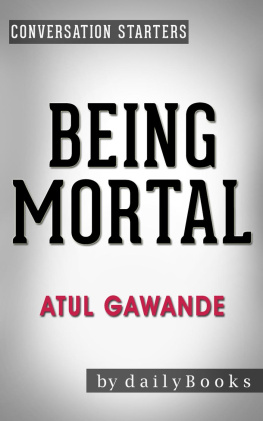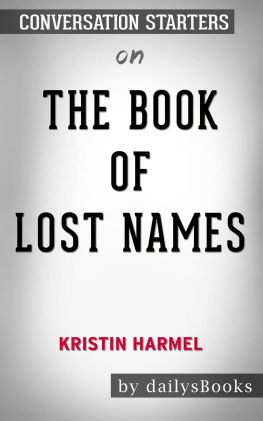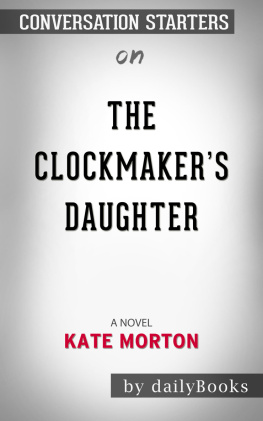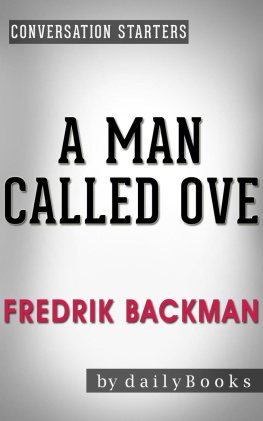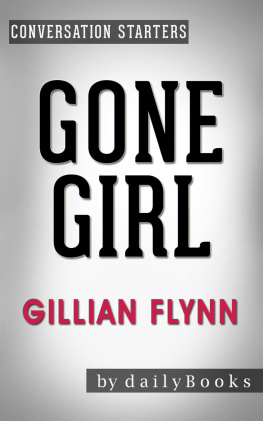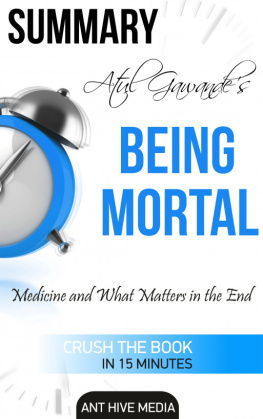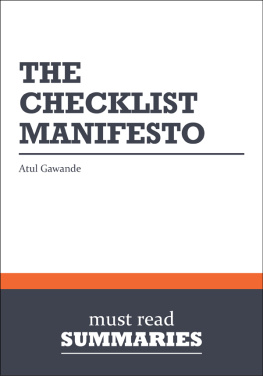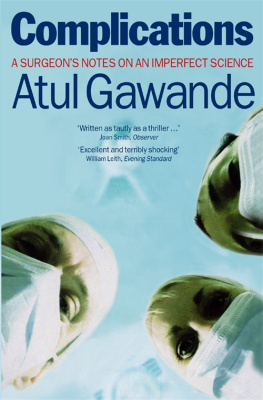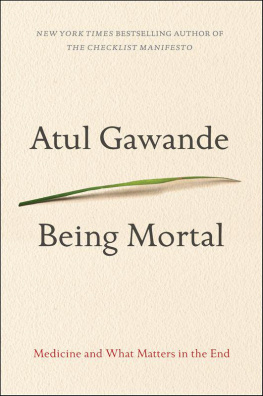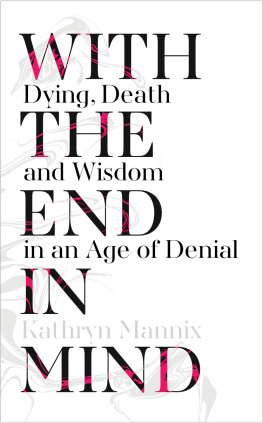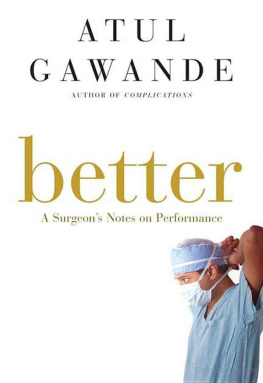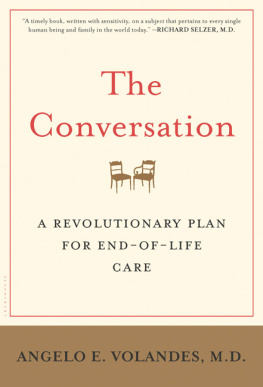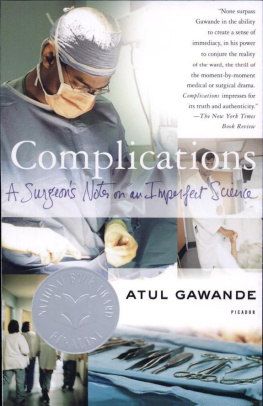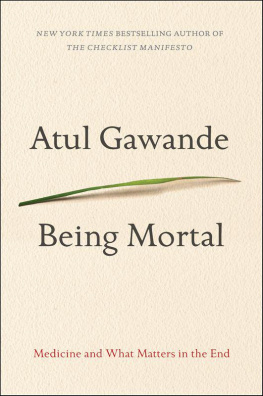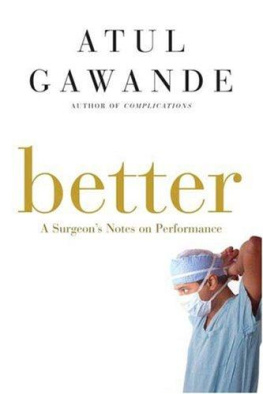Conversation Starters
for
Atul Gawandes
Being Mortal
By dailyBooks
FREE Download: Get the Hottest Books!
Get Your Free Books with Any Purchase of Conversation Starters!
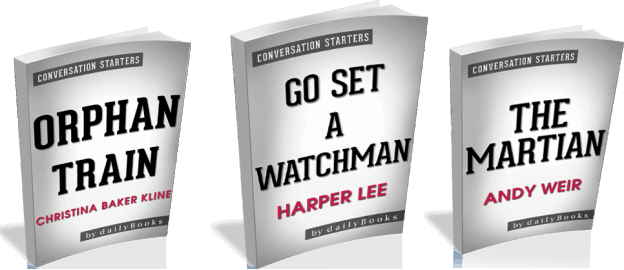
Every purchase comes with a FREE download of the hottest titles!
Add spice to any conversation
Never run out of things to say
Spend time with those you love
Read it for FREE on any smartphone, tablet, Kindle, PC or Mac.
No purchase necessary - licensed for personal enjoyment only.

or Click Here.

Scan Your Phone
Please Note: This is an unofficial conversation starters guide. If you have not yet read the original work, please do so first.
Copyright 2015 by dailyBooks.All Rights Reserved.
First Published in the United States of America 2015
We hope you enjoy this complementary guide from dailyBooks . We aim to provide quality, thought provoking material to assistin your discovery and discussions on some of todays favorite books.
Disclaimer / Terms of Use: Product names, logos, brands, and other trademarks featured or referred to within this publication are the property of their respective trademark holders and are not affiliated with dailyBooks. The publisher and author make no representations or warranties with respect to the accuracy or completeness of these contents and disclaim all warranties such as warranties of fitness for a particular purpose. This guide is unofficial and unauthorized. It is not authorized, approved, licensed, or endorsed by the original book's author or publisher and any of their licensees or affiliates.
No part of this publication may be reproduced or retransmitted, electronic or mechanical, without the written permission of the publisher.
Tips for Using dailyBooks Conversation Starters:
EVERY GOOD BOOK CONTAINS A WORLD FAR DEEPER THAN the surface of its pages. The characters and their world come alive through the words on the pages, yet the characters and its world still live on. Questions herein are designed to bring us beneath the surface of the page and invite us into the world that lives on. These questions can be used to:
- Foster a deeper understanding of the book
- Promote an atmosphere of discussion for groups
- Assist in the study of the book, either individually or corporately
- Explore unseen realms of the book as never seen before
About Us:
THROUGH YEARS OF EXPERIENCE AND FIELD EXPERTISE, from newspaper featured book clubs to local library chapters, dailyBooks can bring your book discussion to life. Host your book party as we discuss some of todays most widely read books.
Table of Contents
Introducing Being Mortal
I N BEING MORTAL , ATUL GAWANDE DISCUSSES THE transformation of medicine in modern times that helps people live better lives but also urges for the improvement of medicine for lives when they are at their end. Gawande says that medicine has improved greatly in the modern world. There are more births, injuries are healed better and faster, serious illnesses and diseases can be managed or cured; however, the care for aging people needs huge improvements.
Atul Gawande talks about nursing homes where patients have been forced to live in their beds or wheelchairs because the homes are concerned about safety. A negative aspect of some hospitals is the isolation of dying people. They often only check vital signs after the possibility of a cure has been long gone. There are also doctors who are so adamant about healing or curing patients that they perform procedures that only prolong suffering.
In Gawande's opinion, the quality of a human life should be placed above everything else. He says this is the ultimate limitation of medical practitioners. Gawande offers solutions that will give the elderly and physically disabled more freedom and a greater quality of life. He discusses hospice care as well and shows that a person can live a rich and dignified life in their last days. Gawande believes that a person at any age has more importance in life than being safe and staying alive for a longer length of time.
In Gawande's view of life, human lives are meaningful because of the moments they have. If a person were to focus on the small minute-by-minute measure of pleasure or pain, they would miss the story or purpose in a person's life. Gawande believes that each person plays a meaningful role, and each life has a purpose. Gawande also believes that a person should have control over what happens in their life even though they may not have control over every circumstance in life.
In Gawande's words, Being Mortal is about the struggle to accept the inevitable death humans face. Gawande acknowledges that scientific advancements in medicine have allowed people to push against the human body's limitations, which was part of why he became a doctor. However, he recognizes the failure of medical professionals to realize those limitations will always exist, as well as the damage that they can do. Medical professionals have been wrong in believing that their job was to ensure the safety and health of the population. Instead, Gawande's opinion is that medical professionals must ensure the well-being of the population.
Introducing the Author
I N BROOKLYN, NEW YORK, IN 1965, ATUL GAWANDE WAS born to Indian immigrants. His parents were both doctors. Even though Gawande was born in New York, his family spent most of his childhood in Athens, Ohio. He graduated from the local high school in 1983. He then went on to Stanford University, where he graduated in 1987 with a degree in Biology and Political Science. He studied at the University of Oxford in England as a Rhodes Scholar. He obtained a master's in economics, philosophy, and politics in 1989. From there, he went on to study at Harvard University where he became a Doctor of Medicine in 1995. In 1999, he earned his master's in public health, and eventually, became a surgeon.
During his undergraduate studies, Atul Gawande worked for numerous political figures on their campaigns including Gary Hart, Al Gore, and Bill Clinton. He was Bill Clinton's healthcare lieutenant. He then began working at the Department of Health and Human Services as their senior advisor. He currently works at the World Health Organization as a director for the Global Patient Safety Challenge department.
Atul Gawande began working at The New Yorker as a staff writer and journalist in 1998. This opportunity came after an article he wrote was published in Slate . In one essay for The New Yorker , he compared the healthcare in two Texas locations. The article caught the attention of United States President, Barack Obama, who cited it in his speech for healthcare reform. Gawande has also been published in the New England Journal of Medicine for military surgery techniques, error in medicine, and many more topics.
In 2002, Atul Gawande's first book, A Surgeon's Notes on an Imperfect Science , was published. It became a finalist for the National Book Award. In 2007, his second book, Better was published and in 2009, The Checklist Manifesto was published. This was Gawande's third book. It became a bestseller for The New York Times in 2010. In 2014, Gawande's most recent book release, Being Mortal: Medicine and What Matters in the End was published.
Next page
